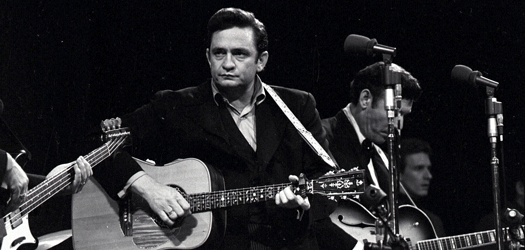I don’t need to tell you anything about Johnny Cash. That’s probably the greatest testament to any artist’s legacy — that their life is elevated to the stuff of myth. The problem with the mythological “Man In Black,” is that we forget all the ways he was just like us, the very reasons he was so beloved. Unlike the airbrushed pop stars of today, Cash connected with the broken down, bruised up, addicted, imprisoned, impoverished, marginalized, and misunderstood.
But make no mistake, Johnny Cash was a huge star, 0ne of the biggest stars there ever was, with over 100 top 40 country hits and 48 singles on the Billboard Hot 100 Pop (yes pop!) charts –about the same number as the Rolling Stones and the Beach Boys. Yet, turn on country radio today and it’s clear that the industry is focused on a very different kind of cash. It’s easy to sigh and lament that times have changed so much since young J.R. showed up at Sun Records in Memphis, Tennessee, but when Johnny Cash returned to public prominence in 2002 with his heart wrenching take on the Nine Inch Nails song “Hurt,” he didn’t do it by pandering to the fashions of the time. He did what he’s always done. He showed us the power of uncompromising, honest, authentic art.
As a songwriter and artist, I don’t look to Johnny Cash as simply a grand figure in the history of American music. To me, he is the quintessential example of how to live and create with integrity. When we take the stage at Eddie’s Attic on May 8th to recreate the iconic record Live At Folsom Prison, we won’t only be celebrating that now timeless, distinctive style that is a genre all it’s own. We’ll be paying tribute to man who continues to teach us about the gritty dignity of staying genuine in a world of sugar-coated copycats. We hope to see you on Wednesday. This is gonna be a good one!
-Eliot Bronson

